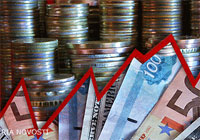Ignatiev Sees Russian Easing Hindered by Economy’s Crosscurrents

(Bloomberg – bloomberg.com – Scott Rose -June 5, 2013) Russia’s central bank faces a “very difficult choice” when it meets next week to review interest rates as conflicting economic data undermine the case for monetary stimulus, outgoing Chairman Sergey Ignatiev said.
“The decision won’t be simple because the situation in the economy isn’t that simple,” Ignatiev, who steps down as chairman later this month, said today at a banking conference in St. Petersburg. “Some economic indicators count in favor of one decision, others support another.”
Economic growth in Russia, the world’s largest energy exporter, has slowed to the weakest pace since a contraction in 2009 as a record-long recession in the euro area saps exports of oil, metals and and natural gas. While corporate investment is sagging and car sales fell in April, signaling the need for monetary stimulus, inflation above the central bank’s target range is confounding policy makers, according to Ignatiev.
“It’s possible we’ll keep all interest rate unchanged,” Ignatiev said. “I don’t rule out another decision, under which some interest rates will be reduced and others kept unchanged.”
Bank Rossii kept its main lending rates unchanged for an eighth month on May 15 and reduced by a quarter point the costs of some longer-term loans, including those backed by gold and non-marketable assets. Ignatiev said the central bank won’t consider raising borrowing costs at their next board meeting on June 10, the last one headed by him before Elvira Nabiullina, President Vladimir Putin’s economic aide, takes over two weeks later.
Investor Bets
Investor bets are pricing in a smaller reduction in rates. The three-month MosPrime rate, which large Moscow banks say they charge one another, may drop 9 basis points, or 0.09 percentage point, in the next three months, according to forward rate agreements tracked by Bloomberg. That compares with a cut of 49 basis points, the most since October 2009, forecast May 22.
The central bank may keep the refinancing rate unchanged at 8.25 percent at the next meeting, according to 18 of 25 economists surveyed by Bloomberg. Seven predict a quarter point cut.
Lending to companies and households increased 19 percent as of May 1 compared with a year earlier, Ignatiev said. In real terms, the advance was 11 percent, which is “much faster” than the pace of the economy. That suggests the pace of lending isn’t weighing on the economy, Ignatiev said.
Inflation Spike
Consumer price growth, which Ignatiev helped drive down to a record low 3.6 percent pace in April and May of last year, has surged to more than double that level to above this year’s target range of 5 percent to 6 percent, preventing policy makers from using easier borrowing costs to shore up the stumbling economy. Inflation accelerated for a second month in May to 7.4 percent, the highest since August 2011, the Federal Statistics Service in Moscow said yesterday. Economists projected the rate would increase to 7.3 percent.
The surge in prices is largely related to a quick rise in some consumer costs because of a bad harvest last year, Ignatiev said. While price growth will probably start slowing in the second half, Ignatiev said he sees a risk that inflation expectations may rise, further fanning prices.
The central bank has held the overnight and one-week repurchase rates, the main tools used to provide banks with cash, at 5.5 percent since September, when they were raised a quarter point. The refinancing rate, used as a signal rate by the bank, has been held at 8.25 percent over the same period. Bank Rossii reduced rates on lesser-used instruments by a quarter point at the last two meetings, which Ignatiev said in April was a “first decision” toward easing.
Ignatiev’s Tenure
Ignatiev, 65, has led the regulator since 2002, seeing the country’s banking system through the 2008-2009 financial crisis that toppled Lehman Brothers Holdings Inc. and allowing the ruble to trade more freely.
Ignatiev has said he plans to accept Nabiullina’s offer to remain at the bank as an adviser once she becomes chairman. The handover to Nabiullina, 49, a former economy minister comes as the central bank prepares for a merger with the main markets regulator and the introduction of Basel III requirements for capital adequacy later this year.
Ignatiev, who left after more than a decade of teaching in what was then Leningrad to join the government as a deputy economy and finance minister in 1991, also worked in 1992 and 1993 as a deputy head of the central bank. He was Alexei Kudrin’s first deputy at the Finance Ministry in 2002 when Putin nominated him for the first of three terms as chairman.
Article ©2013 BLOOMBERG L.P. ALL RIGHTS RESERVED. Article also appeared at http://www.bloomberg.com/news/2013-06-05/ignatiev-sees-russian-easing-hindered-by-economy-s-crosscurrents.html
